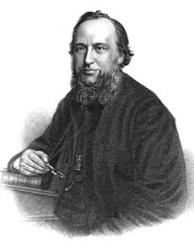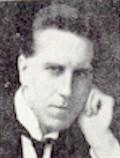Planning worship?
Check out our sister site, ZeteoSearch.org,
for 20+ additional resources related to your search.
- |
User Links
Person Results
E. J. Hopkins

1818 - 1901 Person Name: Edward J. Hopkins Composer of "DEVA" in Hymns of the Church Dr Edward John Hopkins MusDoc United Kingdom 1818-1901. Born at Westminster, England, the son of a clarinetist with the Royal Opera House orchestra, he became an organist (as did two of his brothers) and a composer. In 1826 he became a chorister of the Chapel Royal and sang at the coronation of King William IV in Westminster Abbey. He also sang in the choir of St. Paul’s Cathedral, a double schedule requiring skill and dexterity. On Sunday evenings he would play the outgoing voluntary at St. Martin’s in-the-field. He left Chapel Royal in 1834 and started studying organ construction at two organ factories. He took an appointment at Mitcham Church as organist at age 16, winning an audition against other organists. Four years later he became organist at the Church of St. Peter, Islington. In 1841 he became organist at St. Luke’s, Berwick St., Soho. Two Years later he was organist at Temple Church, which had a historic organ (built in 1683). He held this position for 55 years. In 1845 he married Sarah Lovett, and they had four sons and five daughters. He was closely associated with the Bach Society and was organist for the first English performances of Bach’s St. Matthew Passion. In 1855 he collaborated with Edward Rimbault publishing “The organ, its history and construction” (3 editions 1855-70-77). In 1864 he was one of the founders of the “College of organists”. In 1882 he received an honorary Doctorate of Music from the Archbishop of Canterbury. He composed 30+ hymn tunes and some psalm chants, used by the Church of England. He died in London, England.
John Perry
E. J. Hopkins
John Julian

1839 - 1913 Author of "Children, blend your voices" in Hymns of the Church Born: January 27, 1839, St. Agnes, Cornwall.
Died: January 22, 1913, Thirsk, Yorkshire, England.
Educated privately, Julian graduated from Durham University (MA 1887), Lambeth (DD 1894), and Howard University in Washington, DC (LLD 1894). He took Holy Orders in 1866, and served as Vicar of Wincobank (1876-1905) and Vicar of Topcliff, Yorkshire (1905-). However, he is best known as a hymnologist. The standard reference work in this field is his massive Dictionary of Hymnology: Origin and History of Christian Hymns and Hymnwriters of All Ages and Nations, Together with Biographical and Critical Notices of Their Authors and Translators. This work has been revised and reprinted several times; its publication dates include:
-- London: J. Murray, 1892
-- London: J. Murray, 1908 (this may be the edition revised by James Mearns (1855-1922), Vicar of Rushden, Hertfordshire)
--Grand Rapids, Michigan: Kregel Publications, 1985
His other works include:
Concerning Hymns, 1874
History of the Use of Hymns in Public Worship, and Their Proper Characteristics, 1894
Carols, Ancient and Modern, 1900
Julian donated his large collection of hymnological books and manuscripts to the Church House, Dean’s Yard, London, where it formed the hymnological department of the library.
www.hymntime.com/tch
John Julian
Gioacchino A. Rossini
1792 - 1868 Person Name: Rossini, 1792-1868 Composer of "FLEURY" in The Sunday School Hymnary Gioacchino A. Rossini; b. 1792, Pesaro; d. 1868, Ruelle near Parise
Evangelical Lutheran Hymnal, 1908
Gioacchino A. Rossini
Frank G. Ilsley
1831 - 1887 Composer of "DANIA" in Pilgrim Songs (Number Two) Born: Circa 1831, Maine.
As of 1880, Ilsley was teaching music in Newark, New Jersey.
--www.hymntime.com/tch
Frank G. Ilsley
Thomas F. Dunhill

1877 - 1946 Person Name: T. F. Dunhill, b. 1877 Composer of "CARMEN ANGELORUM" in Church Hymns Born: February 1, 1877, Hampstead, London, England.
Died: March 13, 1946, Scunthorpe, Lincolnshire, England.
Buried: Appleby, Lincolnshire, England.
Dunhill was a gifted piano student, and a childhood enthusiast for the light operas of Gilbert & Sullivan, whose work he emulated by composing a number of small operettas in his teens. In 1893, he enrolled at the Royal College of Music, London, studying pianoforte under Franklin Taylor and composition under Charles Stanford. His contemporaries included Ralph Vaughan Williams, Gustav Holst, and John Ireland, who remained a lifelong friend. He won an open scholarship for composition in 1897.
Dunhill was a music-master at Eton College for several years before becoming a professor at the Royal College of Music in 1905. From 1907-19 he gave concerts of chamber music in London. He himself wrote chamber music and also songs and song-cycles. His song-cycle The Wind Among the Reeds, for tenor voice and orchestra, was first performed by Gervase Elwes with the Royal Philharmonic Orchestra at Queen’s Hall in 1912. His setting of William Butler Yeats’ "The Cloths of Heaven" is well known. Elwes (with Frederick B. Kiddle) recorded his song "A Sea Dirge," a setting of Shakespeare’s lyric "Full fathom five."
In July 1918, Dunhill chaired the meeting of Directors of the Royal Philharmonic Society which set out to reclaim democratic control of the Society’s affairs when, during World War I, they had largely fallen under the single, if highly benevolent, control of Thomas Beecham and his secretary Donald Baylis.
Dunhill gave a concert of music by British composers in Belgrade in 1922, which included his own Symphony in A minor composed during the war, and in 1924 contributed Serbian articles to the Dent Musical Dictionary/.
After the war, Dunhill’s work shifted from orchestral and chamber music toward light opera and other genres. In 1931, his light opera Tantivy Towers was a considerable success in London, and a suite of ballet movements, Gallimaufry, was performed in Hamburg in 1937.
During the 1920s and 1930s, he wrote very many small pieces for piano, for musicians to play at home, many of which were published. Some of his elementary pieces are still used by the Associated Board (ABRSM) for examinations. Dunhill had from 1906 been a senior examiner for the ABRSM, taking him overseas on several occasions.
Dunhill led a busy life as an administrator, in addition to his work as a composer, teacher and examiner. He adjudicated at several regional music festivals, lectured and occasionally broadcast on the BBC. In the early 1940s he composed a number of suites for wind instruments, which continue to be popular.
In 1914, Dunhill married Molly Arnold, a great-grand-daughter of Thomas Arnold of Rugby. She died of tuberculosis in 1929. They had three children. (One of his sons, David Dunhill, 1917-2005, was a BBC radio announcer for many years.) In 1942, he married Isobel Featonby; they both became music teachers at Eton College during World War II.
Dunhill’s works include:
Chamber Music: A Treatise for Students (London: Macmillan, 1913)
"Edward German, An Appreciation"(Musical Times, Vol. 77, No. 1126 (December 1936), pp. 1073–77)
Sullivan’s Comic Operas—A Critical Appreciation (London: Edward Arnold, 1928)
Sir Edward Elgar (London: Blackie & Son, 1938)
© The Cyber Hymnal™ (www.hymntime.com/tch)
Thomas F. Dunhill
Morgan Rhys
1716 - 1776 Author of "Sweetly sang the glorious angels" Rhys, Morgan, a famous Welsh hymnwriter of the last century. He published several collections of hymns under quaint titles. Golwg o ben Nebo ar wlad yr Addewid (A View of the land of promise from the top of Mr. Nebo). Frwyd Ysbrydal (The Spiritual Warfare). Graddfanan y Credadyn, &c. (The Groanings of the Believer). He died in 1776, and was buried at Llanfynydd Church, in Caermarthenshire. [Rev. W. Glenffrwd Thomas]
--John Julian, Dictionary of Hymnology (1907)
==================
Rhys, Morgan, p. 959, i. A short notice of this writer (a schoolmaster in connection with the Calvinistic Methodists), is given in H. Elvet Lewis's Sweet Singers of Wales, 1889, together with a few translations into English of his hymns.
--John Julian, Dictionary of Hymnology, Appendix, Part II (1907)
Morgan Rhys
R. E. Williams
Person Name: Rev. R. E. Williams Translator of "Sweetly sang the glorious angels" in Christmas Carols together with Certain Familiar Hymns and Songs
R. E. Williams


 My Starred Hymns
My Starred Hymns


